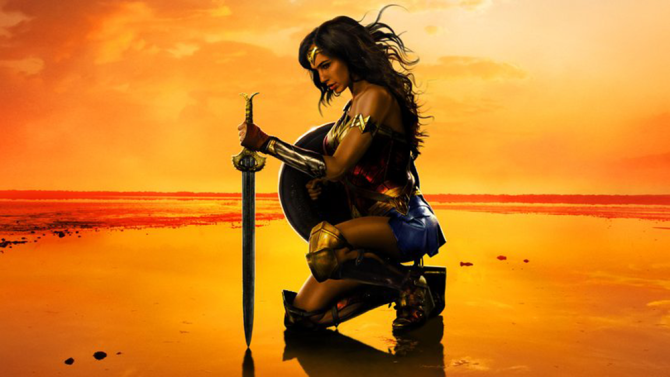In the opening minutes of Wonder Woman, young Princess Diana (played by the precocious Lilly Aspell), bounds about the island of Themyscira with such a tireless enthusiasm, imitating lady warriors in training, channeling the energy of Wall Street’s Fearless Girl, defiant of rules and stereotypes. Even as her mother, Queen Hippolyta (Connie Nielson), tries to subdue her daughter’s eagerness to place herself in precarious circumstances, we can tell that Diana is cut from a different cloth. This is an origin story untold on the big screen before now, and in a cinematic society weary of such redundancies, the coming of age of the would be Amazonian princess is welcome, and in so many ways, necessary.
For the past decade, Marvel Studios has coasted along on the coattails of a genuinely decent cinematic universe, wherein rival DC has limped along with luke warm to abysmal attempts post-Nolan at keeping up with the Jonses. Rabid fandom aside, DC has mostly earned the reputation of being the VH1 to Marvel’s MTV. But credit where credit is due, DC is the first studio to test the theory that a female centered superhero film can stand alongside the glut of “fill in the blank”-man movies that have strong armed the studio’s purse strings for far to long. Giving the reigns to a passionate, visionary filmmaker like Patty Jenkins was also the right thing to do. There is an undercurrent of authenticity to this film, as if it knows it carries an extra burden. Fair or not, Wonder Woman needed to be more than entertaining.
Wonder Woman needs to be examined on multiple fronts. As a superhero film, it’s decent, much in the way most of these genre films are. There will be things that work and things that will not, but generally you will feel a sense of satisfaction when the credits start rolling. And yet, Twitter trolls will spew nonsense, and fanboys will gather to defend. If you can block out that noise, you can expect an above average slice of blockbuster pie that isn’t without its flaws.
Comparisons can be made to Captain America: The First Avenger in both style and structure. The pacing isn’t always a strength, and it does feel the full weight of the 141 minute run time as a result. The film ultimately falls into familiar genre trappings, where CGI assumes command of a final battle between super-beings in a dark cacophony of sight and sound. But enough good will has been earned by that point for me to forgive most of that. It isn’t terrible, just familiar.
As maligned as Producer Zack Snyder is with a lot of his creative choices, casting Gal Gadot is purely inspired. She is perfect, and with no disrespect to Linda Carter, she is the Wonder Woman for all going forward. Gadot brings so many layers of Diana Prince to life, portraying her with a fearless intensity that smacks of both strength and vulnerability. There is a grace and beauty to Diana, and yet her fierce sense of duty never wavers. Between Gadot’s talent and Jenkins’ direction, Wonder Woman never strays down a path that could have cheapened it.
To that end, props to Chris Pine (as Captain Steve Trevor), who never oversells himself. He seems to understand there is something bigger going on here, and his portrayal of Trevor never impedes on Gadot. Pine shows range with the character- sometimes frustrated, confused, or downright angry- but he’s always respectful of Diana’s role within this world.
All of the plot devices and technicalities of filmmaking aside, the success of Wonder Woman, at least for me, lies squarely on its ability to serve as a beacon for gender equality. And I’m of the opinion (admittedly the opinion of one white bred, middle aged dude), that this film succeeds on that front. Every time I started to get concerned the line might get crossed- when the male hero might be called upon to save the day- Jenkins and Gadot sidestep, making sure the focus stays on Diana as hero, keeping the male characters involved but at a respectable distance that never feels unnatural.
To that end, we male critics can comment on the basics of storytelling, or on technical merit, or character development, but I don’t feel as if we have the right to pass judgement on this film based on our experience outside of those particular contexts. It isn’t our film, guys. We can love it or hate, but what matters is the way it lands with women who find inspiration from the main character. What matters are the women who have felt the brunt of misaligned gender politics and look to a simple film as a step in the right direction. What matters are women who find courage and strength in a world that doesn’t often allow them to express those traits. What matters are the multitudes of little girls who don the warrior princess’ outfit and walk away empowered, seeing themselves as equals, seeing themselves in the same context as their male peers who sport Iron Man and Captain America gear on Halloween. It’s really the only thing that matters here, and it’s long overdue.

